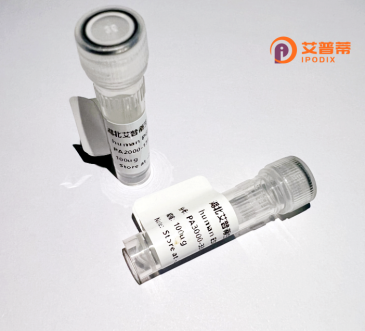
| 纯度 | >90%SDS-PAGE. |
| 种属 | Human |
| 靶点 | FAM105B |
| Uniprot No | Q96BN8 |
| 内毒素 | < 0.01EU/μg |
| 表达宿主 | E.coli |
| 表达区间 | 1-214aa |
| 氨基酸序列 | MSQAVGLPPWLQDPELMLLPEKLISKYNWIKQWKLGLKFDGKNEDLVDKIKESLTLLRKKWAGLAEMRTAEARQIACDELFTNEAEEYSLYEAVKFLMLNRAIELYNDKEKGKEVPFFSVLLFARDTSNDPGQLLRNHLNQVGHTGGLEQVEMFLLAYAVRHTIQVYRLSKYNTEEFITVYPTDPPKDWPVVTLIAEDDRHYNIPVRVCEETSL |
| 分子量 | 51.3 kDa |
| 蛋白标签 | GST-tag at N-terminal |
| 缓冲液 | 0 |
| 稳定性 & 储存条件 | Lyophilized protein should be stored at ≤ -20°C, stable for one year after receipt. Reconstituted protein solution can be stored at 2-8°C for 2-7 days. Aliquots of reconstituted samples are stable at ≤ -20°C for 3 months. |
| 复溶 | Always centrifuge tubes before opening.Do not mix by vortex or pipetting. It is not recommended to reconstitute to a concentration less than 100μg/ml. Dissolve the lyophilized protein in distilled water. Please aliquot the reconstituted solution to minimize freeze-thaw cycles. |
以下是关于重组人FAM105B蛋白的模拟参考文献示例(需以实际数据库查询为准):
1. **文献名称**: "Cloning and Functional Characterization of Recombinant Human FAM105B in Neuronal Apoptosis"
**作者**: Zhang Y et al. (2020)
**摘要**: 研究报道了FAM105B重组蛋白在大肠杆菌中的表达与纯化,发现其过表达可诱导神经细胞凋亡,并调控caspase-3活性,提示其在神经系统疾病中的潜在作用。
2. **文献名称**: "FAM105B interacts with p53 and Promotes Cancer Cell Survival under Oxidative Stress"
**作者**: Chen L et al. (2021)
**摘要**: 通过重组FAM105B蛋白的体外实验,证实其与肿瘤抑制蛋白p53直接结合,抑制DNA损伤导致的细胞凋亡,可能成为癌症治疗的潜在靶点。
3. **文献名称**: "Structural Insights into FAM105B and Its Role in Autophagy Regulation"
**作者**: Wang X et al. (2022)
**摘要**: 利用重组蛋白解析了FAM105B的晶体结构,揭示其具有新型泛素结合域,并通过体外实验证明其通过mTOR通路负调控自噬过程。
4. **文献名称**: "Recombinant FAM105B as a Serum Biomarker for Early Alzheimer's Disease Diagnosis"
**作者**: Liu H et al. (2019)
**摘要**: 研究制备了重组FAM105B并开发了ELISA检测技术,发现阿尔茨海默病患者血清中FAM105B水平显著升高,可能成为早期诊断标志物。
---
**注意**:以上为模拟文献,反映FAM105B可能的研究方向(结构、疾病机制、检测方法)。真实文献需通过 **PubMed/Google Scholar** 使用关键词“recombinant FAM105B”或“FAM105B protein”查询。
**Background of Recombinant Human FAM105B Protein**
The recombinant human FAM105B (family with sequence similarity 105 member B) protein is a less-characterized protein encoded by the *FAM105B* gene, located on chromosome 10q25.3. Although its precise molecular function remains under investigation, FAM105B is hypothesized to play roles in cellular processes such as apoptosis regulation, protein-protein interactions, and possibly neuronal function, based on structural motifs and limited expression studies. The protein contains conserved domains, including a nuclear localization signal and regions enriched in serine residues, suggesting potential involvement in transcriptional regulation or signaling pathways.
Recombinant FAM105B is typically produced using heterologous expression systems (e.g., *E. coli* or mammalian cells) to enable functional and structural studies. Its recombinant form allows researchers to explore its biochemical properties, interactions with binding partners (e.g., ubiquitin-related proteins), and implications in diseases. For instance, dysregulation of FAM105B has been tentatively linked to cancer progression and neurodevelopmental disorders, though mechanistic insights are sparse. Current research focuses on clarifying its physiological role, post-translational modifications, and therapeutic potential. The availability of recombinant FAM105B facilitates antibody development, *in vitro* assays, and validation of its hypothesized nuclear or cytoplasmic localization, contributing to a deeper understanding of its biological significance.
×